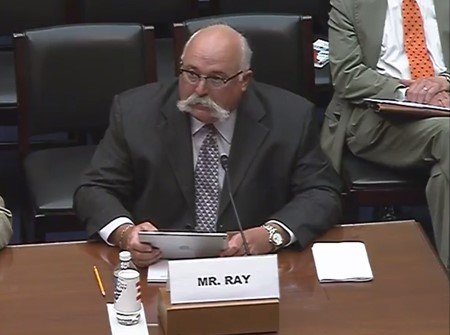CCA testifies before Congress on red snapper fiasco
Three-day season in 2017 marks new low in federal management of popular fishery

Washington, D.C. – May 2, 2017 — On the same day that NOAA Fisheries announced the shortest recreational red snapper season in history, Mark Ray, chairman of CCA Texas, was testifying before a Congressional hearing on dismal federal management of the fishery in the Gulf of Mexico. Ray told the House Subcommittee on Interior, Energy and the Environment, chaired by Rep. Blake Farenthold (R-Texas), that red snapper is a man-made fishery management disaster.
“By any measure, the red snapper fishery in the Gulf of Mexico should be held up as a shining example of proper management and good conservation. But as this hearing demonstrates, that is not the case. We aren’t here today to highlight a conservation success story. Unfortunately, we are here because red snapper is known throughout the nation as a man-made fishery management disaster,” Ray said. “After decades under intense federal management, this is the best that anglers can hope for – a three-day season in federal waters in 2017. I don’t think anyone would declare the current situation a success. All we ask for is a system that allows all stakeholders the best opportunity to enjoy and use those resources. I am here today to ask of you to give us that chance.”
NOAA Fisheries continued its march to completely shut down the recreational red snapper fishery in federal waters with its announcement that the recreational season for red snapper will begin on June 1 and last just three days in 2017. While the recreational season is being decreased from 9 days in 2016 to just three this year, it was also announced that the season for the charter/for-hire sector is being lengthened to 49 days while the commercial sector continues to enjoy year-round access to their privately held red snapper shares.
The 2017 season for private recreational anglers is the shortest on record and at least one U.S. Senator wasted no time voicing his displeasure at the never-ending downward spiral of recreational fishing access under NOAA Fisheries.
“I am deeply troubled and disappointed with NOAA’s decision to considerably shorten the federal recreational fishing season for red snapper in the Gulf. NOAA’s announcement today is unacceptable,” U.S. Senator Richard Shelby of Alabama said in a news release. “Over the years, I have consistently authored several provisions to improve the red snapper stock assessments and allowable catch limits. These actions include expanding the state boundary for catching reef fish out to nine miles, which is not subject to the federal season. In fact, the recent FY2017 government funding bill makes this boundary permanent. NOAA’s rule is a significant step backward in our progress to increase limits for private anglers in federal waters. I look forward to working with President Trump and Commerce Secretary Ross to develop a system that actually serves the U.S. recreational fishing community.”
Over the past year, a series of investigative newspaper articles and TV reports has highlighted the highly controversial schemes favored by NOAA Fisheries that give shares of red snapper away to commercial entities to use for their own profit. Under these privatization programs, known as catch shares, almost three-quarters of the entire red snapper fishery in the Gulf of Mexico is on the way to being privately held by commercial entities, further frustrating anglers who have watched their opportunity to pursue red snapper all but disappear under federal management.
“With a three-day season and a federal system that seems committed to funneling access to our public marine resources to fewer and fewer people, there isn’t much for recreational anglers to work with under federal management as it currently operates,” said Bill Bird, chairman of CCA’s National Government Relations Committee. “Sen. Shelby has done a tremendous amount of work in the past to help recreational anglers and we truly appreciate his comments today. We are certainly encouraging other elected officials to join him in his efforts to work with the Trump Administration to chart a new course for the management of our marine resources.”









